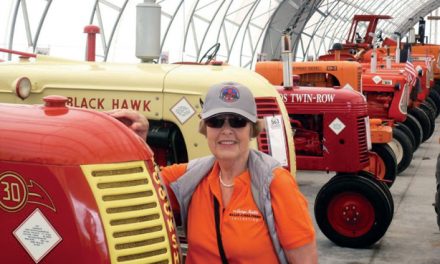While it is a learning process for all involved, if you take the time to learn the process of participating in an online auction, there are things that can reduce the stress level. Courtesy Photo
By Terry Tinkess
AgriNews Staff Writer
For people of a certain vintage, talk of an auction brings back memories of either congregating in some sort of outbuilding, or perhaps in a farmyard and listening to the auctioneer rhyming through his or her monologue, interrupted only by calls or signals from the crowd and punctuated by the cry of “Sold”, notifying all present of the successful sale of one of many items available that day.
For the younger audience, an auction means sitting in front of a computer and bidding on just about anything; and with the auction taking anywhere from a day to a week or longer with the only indication of success being an email notifying the successful bidder that they could now make payment and arrange for delivery.
However, when the world essentially shut down during the pandemic, a change occurred where the two different platforms merged, creating auctions that took place online in a timed format, but involving equipment, farm and otherwise being bought and sold. While this evolution may have occurred naturally, sales of used equipment are usually robust when new equipment manufacturers face challenges, such as those that were created during the pandemic, and which currently exist within the supply chain.
Ritchie Bros. Auctioneers is a publicly traded Canadian company with headquarters in Burnaby, B.C. They started hosting online auctions in 2002, but most of their business remained linked to live auctions. According to Luke Fritshaw, regional sales manager in Saskatoon, the popularity of timed online auctions took off at the onset of the COVID-19 pandemic in early 2020. In an interview with Farm Credit Corporation (FCC) he explained why:
“It’s just a lot more accessible,” said Fritshaw. “More customers can manage their time and business, and still be able to bid on equipment a few days before. Or, they don’t have to sit down until minutes before the actual closing time.”
That doesn’t mean you don’t need to do your homework ahead of time. You need to know what you’re looking for, know values, and be aware of any problems that a used piece of equipment could experience and weigh that against the savings that can be realized. As with just about anything in life, there are plusses and minuses.
For example, if you were to purchase a new piece of equipment, in the right situation you might visit a few local dealers and investigate the cost of buying new, keeping in mind that if you are able to pay cash, that usually a large amount of cash is no longer available to you for other uses. You might be able to lease, which has some tax benefits, but can also be expensive, or you could investigate whether the dealer has any financing options available. Regardless, you are buying a new piece of equipment and it will be as costly as it will ever be during its lifecycle, but it should come with a warranty (and have extended coverage available).
One other benefit of buying new, is the dealer may take your old equipment as a trade in, saving you from having to sell it yourself. You probably won’t get as much as you would if you sold privately, but it’s quick and easy and the trade-in can be applied to the purchase price of your new machine.
With an auction there is no supply chain issue; the equipment is available until it is sold, and if you’re the winning bidder, you pay up and arrange to have it shipped or delivered to you, which you should remember might not be a minor expense.
A bigger issue might be that you are bidding on a piece of equipment based largely on photos and the information contained in the listing. You need to be aware of the value of the equipment, and any problems that might pop up. Third party financing can sometimes be arranged (preferably before you hear the word “Sold!”)
Before you even think of bidding on something, you need to familiarize yourself with the process the specific auction house follows. Bidding no longer opens when an auctioneer gets to a specific item or group of items, but days before the time for that auction expires.
That means customers can put in their maximum bids early and then check back to see if they are still the high bid.












